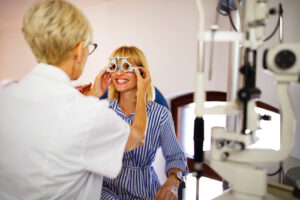Does your vision seem blurry or distorted? Do you struggle when you try to see your computer screen at work?
Even if you’ve never needed glasses or other visual aids before, it may be time. Sharp vision is an essential part of keeping your vision healthy and being able to see the world around you. Keep reading to discover what your eye doctor wants you to know about keeping your vision sharp!
The Power of Regular Eye Exams

Did you know eye exams are about more than updating your glasses and contact lens prescriptions? It’s beneficial to know this, especially if you’ve never needed these visual aids to see before.
Eye exams are comprehensive check-ups for your eyes that provide you with crucial insights into their health. Without an eye exam, there’s no good way to determine how healthy your eyes are!
Want to avoid potential vision loss due to eye conditions like glaucoma and cataracts? Scheduling and undergoing regular eye exams are your best defense against these potential vision-stealing conditions.
You can think of eye exams as an early warning system. With them, you can intervene promptly, ensuring better visual outcomes. When your vision is a priority, your eyes are better off.
How are Healthy Eyes and a Healthy Body Connected?
Your eyes are so much more than your windows into seeing the world around you. They can also provide you with valuable insights into how healthy you really are.
Sure, you can learn about your health from your primary care physician, but your eye doctor can tell you much more than you may think! Certain conditions, such as diabetes and high blood pressure, often show early signs in the eyes.
These signs may not be evident in other parts of the body, so if you receive an early diagnosis, this can have a positive impact on the rest of your health. Your eye doctor can identify these signs by closely monitoring your eye health.
Early detection is always ideal whenever possible, making it easier to manage any systemic conditions or other health problems that may be found. It’s a powerful reminder that taking care of your eyes goes hand in hand with caring for every part of your body.
Practical Tips for Preserving Your Vision
As you only get one set of eyes, preserving your vision in whatever ways you can is crucial. Making small lifestyle changes doesn’t have to be overwhelming, so why not try out some of these practical tips to help your eyes and vision?
Shield Your Eyes from the Sun in the Shade

Want to protect your eyes? Wearing sunglasses that protect from the sun’s harmful UV rays is an excellent place to start.
You can also do your best to stay in the shade, especially during peak hours of sunlight. If you’re participating in activities that may cause harm to your eyes, remember to wear protective gear like goggles and other eyewear while working with hazardous materials. If you play contact sports, invest in headgear to keep your head and eyes safe while participating.
Remember to Take Regular Breaks
As the world becomes increasingly digital, taking regular breaks from the screens has never been more important. Whether it’s your phone, tablet, or computer, remember to follow the 20-20-20 rule whenever you can.
Having breaks from the screens is especially necessary if you spend time in front of a screen or several screens for your job. Give your eyes a break during prolonged screen time by following the 20-20-20 rule.
Every 20 minutes, look away from your screen and focus on something 20 feet away for about 20 seconds. Remember that what you’re focusing on should not be another screen.
Find something on the wall to look at, or take a walk to give your eyes a much-needed break. Practicing the 20-20-20 rule is an excellent way to reduce eye strain and fatigue and keep your eyes healthy, no matter what you may throw at them.
Nourish Your Eyes By Eating Well

Do your eyes feel dry? You might need to add more omega-3 fatty acids to your diet.
Eating a balanced diet filled with fruits, vegetables, and fatty fish can keep your eyes feeling their best and well-hydrated and lubricated. Stock up on salmon, tuna, and other fatty fish to get your omega-3 fatty acids.
You can take supplements for similar benefits if you don’t want to eat more fish. Your eyes will thank you!
Stop Smoking if You Haven’t Already
Everybody knows smoking is bad for you, but your eyes are no exception. If you’re a smoker and haven’t quit, do it for your eyes.
Smoking increases your risk of developing conditions like age-related macular degeneration and the potential for the earlier formation of cataracts. If you’re struggling to quit, talk to your doctor.
Stay Hydrated

Drinking enough water is not only good for your overall health but also helps maintain healthy eyes. Proper hydration ensures that your eyes stay lubricated, reducing the chances of dryness and irritation.
Additional Recommendations
In addition to following the above tips, here are a few more recommendations to keep your eyes happy and healthy!
Keep Your Eyes Clean
Want healthy eyes? Start by always washing your hands before touching your eyes or handling contact lenses. Doing this is good eye hygiene that will help prevent infections. Fewer infections will make your eyes healthier and your vision at its best.
Get Enough Sleep

Healthy eyes need enough rest to allow them to recharge and rejuvenate. Aim for 7-8 hours of quality sleep each night, including on the weekends.
Stay Active
Following a regular exercise routine improves blood circulation. Getting blood circulating to your eyes will help them stay healthy and lead to your vision being more consistent.
Whether outside or jogging on the treadmill, do your best to participate in exercises that keep you active.
Keep Chronic Health Conditions Under Control

Having a chronic health condition doesn’t have to mean you’re unhealthy. If you have existing health conditions like diabetes or high blood pressure, work with your primary care physician on the best way to manage them.
Keeping them under control is the best way to protect your eyes from potential complications.
Remember, regular eye exams are essential for healthy eyes. Taking care of your eyes is an integral part of caring for your well-being. These tips can help you implement a healthier routine and embark on a lifelong vision wellness journey.
Are you ready to prioritize your eyes? Schedule an eye exam at South Texas Eye Institute in San Antonio, TX, now!

